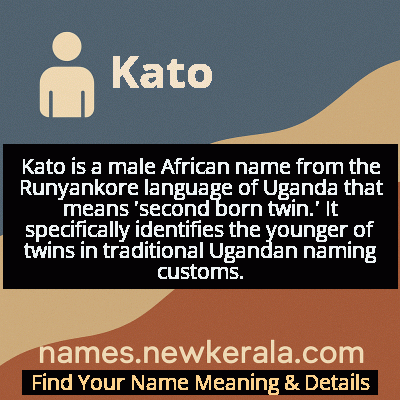Kato Name Meaning & Details
Origin, Popularity, Numerology Analysis & Name Meaning of Kato
Discover the origin, meaning, and cultural significance of the name KATO. Delve into its historical roots and explore the lasting impact it has had on communities and traditions.
Name
Kato
Gender
Male
Origin
African
Lucky Number
2
Meaning of the Name - Kato
Kato is a male African name from the Runyankore language of Uganda that means 'second born twin.' It specifically identifies the younger of twins in traditional Ugandan naming customs.
Kato - Complete Numerology Analysis
Your Numerology Number
Based on Pythagorean Numerology System
Ruling Planet
Moon
Positive Nature
Diplomatic, friendly, artistic, empathetic.
Negative Traits
Over-sensitive, moody, indecisive, prone to self-pity.
Lucky Colours
Green, cream, white.
Lucky Days
Monday.
Lucky Stones
Pearl, moonstone.
Harmony Numbers
1, 3, 4.
Best Suited Professions
Diplomats, mediators, caregivers, artists.
What People Like About You
Cooperative spirit, friendliness, artistic talent.
Famous People Named Kato
Kato Lubwama
Actor and Politician
Ugandan Member of Parliament and renowned theater actor
Kato Ssebunya
Environmentalist
Ugandan conservationist known for his work with chimpanzees and wildlife protection
Kato Kajubi
Educator
Prominent Ugandan academic and former Vice Chancellor of Makerere University
Kato Kimanuka
Military Officer
Ugandan army officer known for his service in peacekeeping missions
Name Variations & International Equivalents
Click on blue names to explore their detailed meanings. Gray names with will be available soon.
Cultural & Historical Significance
The cultural importance of the name extends beyond mere identification, serving as a marker of cultural identity and family history. In many Bantu communities, including the Runyankore, names are not randomly chosen but carry specific meanings and historical references that connect individuals to their ancestors and cultural traditions. The practice of naming twins with specific birth-order names like Kato helps maintain cultural continuity and reinforces the importance of family structure within the community. This naming convention also reflects the sophisticated understanding of relationships and social roles within traditional African societies, where each individual's position and responsibilities were clearly defined and respected.
Extended Personality Analysis
Individuals named Kato are often perceived as having complementary and balanced personalities, reflecting their traditional role as the second twin. They are typically seen as adaptable, cooperative, and supportive individuals who excel in partnership and teamwork. Many Kato-named individuals display a natural ability to mediate and bring harmony to group situations, possibly stemming from the inherent duality and balance associated with twin relationships. They often demonstrate strong relational skills, emotional intelligence, and the capacity to understand multiple perspectives. While they can be independent when necessary, those named Kato frequently thrive in collaborative environments and are known for their loyalty to family and close relationships.
Beyond their relational strengths, people named Kato often exhibit a unique blend of traditional values and modern adaptability. They tend to be deeply connected to their cultural roots while being open to new experiences and perspectives. This balance allows them to navigate different social contexts with ease and grace. Their personality often includes a strong sense of responsibility toward family and community, coupled with an innate understanding of the importance of maintaining relationships and social harmony. The name's association with being part of a pair often translates into individuals who are excellent team players, reliable partners, and natural peacemakers who value connection and mutual support in their personal and professional lives.
Modern Usage & Popularity
In contemporary times, the name Kato continues to be widely used in Uganda and among the Ugandan diaspora, maintaining its traditional significance while also being adopted by parents who appreciate its cultural heritage and melodic sound. The name has seen consistent usage in East African communities, particularly in western Uganda where the Runyankore and related Bantu languages are spoken. While it remains most common within its cultural context, globalization and increased cultural exchange have led to some adoption of the name by non-Ugandans who are drawn to its meaningful origin and distinctive quality. The name maintains moderate popularity in its regions of origin and is often chosen to honor family traditions and cultural identity, especially in families with twin birth histories or those wanting to preserve Bantu naming customs. In urban areas and among younger generations, the name continues to be respected for its cultural authenticity while adapting to modern naming trends.
Symbolic & Spiritual Meanings
Symbolically, Kato represents duality, partnership, and the concept of complementary existence. As the name for a second-born twin, it embodies the idea of balance and interconnectedness, suggesting that individuals are part of a larger whole. The name carries connotations of harmony, mutual support, and the strength found in partnership. In broader symbolic terms, Kato can represent the yin-yang principle of complementary opposites working together to create completeness. It symbolizes the importance of relationships, the value of having a counterpart, and the idea that some strengths are only fully realized through connection with others. The name also carries undertones of tradition, cultural continuity, and the passing down of heritage through generations, serving as a living link between past and present while honoring the special bond between twins and the unique dynamics of multiple births.

